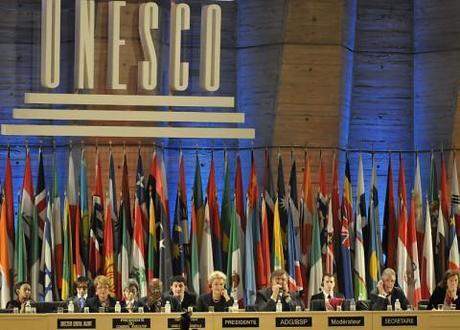
UNESCO leaders forum. Photo credit: UNESCO
In a move that seemed a victory for the Palestinian quest for recognition, the United Nations Educational, Scientific and Cultural Organisation (UNESCO) voted to extend full membership to the Palestinian Authority, becoming the first UN body to confer statehood on the Palestinian people since President Mahmoud Abbas applied for full recognition by the UN General Assembly in September.
In a move that undermines that victory, the US State Department immediately announced that it would make good on its threat to cut funding for UNESCO – a big problem, as the US currently supplies 22 percent of the organisation’s operating budget.
What is UNESCO? UNESCO is a special body of the UN that seeks to build “a culture of peace, the eradication of poverty, sustainable development and intercultural dialog through education, the sciences, culture, communication and information”. It’s best known, however, for denoting “World Heritage” sites, protected cultural landmarks popular with the tourists.
The vote carried with 107 for, 14 against and 52 abstentions; it was met with cheers at UNESCO’s headquarters in Paris, worry from the body’s Director General, and a flock of criticisms from America and Israel.
Bokova’s speech, in French and English
So, is this Pyrrhic victory any sort of victory at all for Palestine? And what will happen to UNESCO?
The State Department, US pols not happy. In the weeks preceding the vote, US officials warned that recognizing Palestine would result in a complete cutoff of US funding. According to the State Department, the UNESCO decision triggered “longstanding legislative restrictions which will compel the United States to refrain from making contributions to UNESCO”, including a $60 million payment scheduled for this month. That legislation, signed into law in 1990 and 1994, stipulates that America will not finance any UN organization that recognizes Palestine as a state; there is, according to The New York Times, no wiggle room on the matter and State Department officials see no possibility for an exception. Victoria Nuland, a State Department spokesperson, denounced the UNESCO vote as “regrettable” and “premature” and added that it “undermines our shared goal of a comprehensive, just, and lasting peace in the Middle East”. Politicians from both parties took a similar tack, according to The New York Times, and some saw the vote as “anti-Israeli”.
Israel says this vote harms the peace process. The Israeli Foreign Ministry, in a statement that was echoed by commentators and politicians, rejected the decision, claiming that it “will bring no change on the ground but further removes the possibility for a peace agreement”. Thanking those nations “which displayed a sense of responsibility” in voting against the membership, the Israeli Foreign Ministry continued, “This decision will not turn the Palestinian Authority into an actual state yet places unnecessary burdens on the route to renewing negotiations. Israel believes that the correct and only way to make progress in the diplomatic process with the Palestinians is through direct negotiations without preconditions.”
US will just take its toys and go home. Blaming President Barack Obama’s “ineffective” foreign policy for not preventing the vote, John Bolton at the US’s conservative National Review Online threw down the gauntlet, declaring, “UNESCO has made its decision: It prefers Palestinian membership to American participation. Now let the rest of the U.N. specialized agencies make their choice.”
UNESCO will survive. This, however, is not the first time the US has yanked its funding from the organization – the US pulled out of UNESCO in 1984, under President Ronald Reagan, who objected to what he claimed was the organisation’s anti-American bias and tendency to politicize cultural issues. Ramzy Baroud, editor of the Palestine Chronicle, told RT that he believes UNESCO will survive.
Score one for Palestine – and its heritage. Stuart Littlewood, author of Radio Free Palestine writing at The Palestine Chronicle, declared a victory for Palestine, claiming that the decision is “good news for them and bad news for their Israeli tormentors” and calling the US decision to pull funding “spiteful”. UNESCO denotes and then protects its “world heritage” sites; with membership, Palestine, Littlewood said, will finally be able to “submit its important sites in its own name for inclusion and protection from Israel’s malicious destructiveness”.
Not any closer to General Assembly recognition. But, reported Flavia Krause-Jackson and David Lerman for Bloomberg, UNESCO membership hasn’t brought Palestine any closer to recognition by the UN General Assembly, the ultimate prize. According to their report, “swing votes the Palestinians need to bolster their support on the Security Council for full UN membership have evaporated”, with three critical Security Council members abstaining from the vote, and analysts claim that UNSECO membership will only complicate any attempt at a two-state solution to the Israeli-Palestine conflict. “UNESCO is far from an unmitigated victory,” Robert Danin of the Council on Foreign Relations told Bloomberg. “This will further strain relations between the U.S. and the Palestinians and harden positions.”

